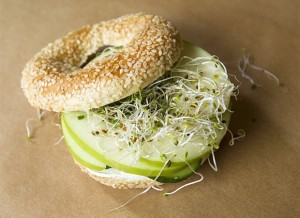Seed sprouts have been implicated as vehicles for numerous foodborne outbreaks worldwide.
 Seed sprouts pose a unique food safety concern because of the ease of microbiological seed contamination, the inherent ability of the sprouting process to support microbial growth, and their consumption either raw or lightly cooked.
Seed sprouts pose a unique food safety concern because of the ease of microbiological seed contamination, the inherent ability of the sprouting process to support microbial growth, and their consumption either raw or lightly cooked.
To examine seed sprout safety in the Australian state of Victoria, a survey was conducted to detect specific microbes in seed sprout samples and to investigate food handling practices relating to seed sprouts. A total of 298 seed sprout samples were collected from across 33 local council areas. Escherichia coli was detected in 14.8%, Listeria spp. in 12.3%, and Listeria monocytogenes in 1.3% of samples analyzed. Salmonella spp. were not detected in any of the samples.
A range of seed sprout handling practices were identified as potential food safety issues in some food businesses, including temperature control, washing practices, length of storage, and storage in proximity to unpackaged ready-to-eat potentially hazardous foods.
Microbiological Safety and Food Handling Practices of Seed Sprout Products in the Australian State of Victoria
Journal of Food Protection®, Number 7, July 2015, pp. 1250-1419
Symes, Sally, Goldsmith, Paul, Haines, Heather
http://www.ingentaconnect.com/content/iafp/jfp/2015/00000078/00000007/art00021
